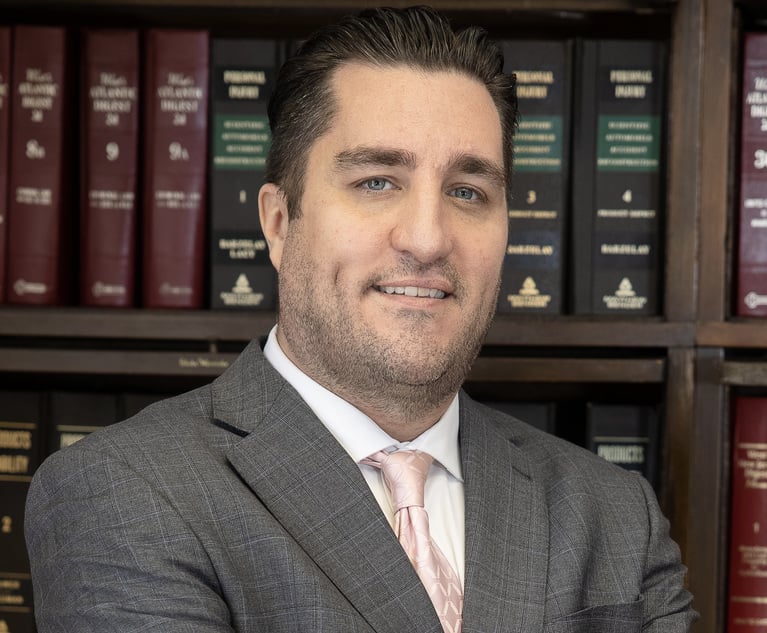New Scheme for Recognition of Foreign Judgments Chafes Some Lawyers
Signed into law by Gov. Chris Christie on his last day in office—with immediate effect—the measure was designed to provide protection from money judgments entered in nations whose courts fail to provide due process.
January 18, 2018 at 06:06 PM
4 minute read

Legislation enacted Monday has made it easier for New Jersey courts to deny recognition of foreign judgments that are illegitimate, but some lawyers said they find the remedy more odious than the problem.
Signed into law by Gov. Chris Christie on his last day in office—with immediate effect—the measure was designed to provide protection from money judgments entered in nations whose courts fail to provide due process. Proponents say that the number of foreign judgments being entered in U.S. courts is increasing and the new law provides a necessary means to fight a form of venue-shopping.
Previously, New Jersey courts evaluating foreign judgments had to contend with “a patchwork” of laws, but now the burden of proof for denying recognition is clarified, said state Sen. Patrick Diegnan Jr., D-Middlesex, a prime sponsor of the law. The New Jersey Law Revision Commission and the New Jersey Civil Justice Institute both recommended change to the foreign judgment laws, said Diegnan. Revisions to the foreign judgment law was first suggested by the Appellate Division in a 2005 case, Enron (Thrace) Exploration & Production v. Clapp, he said.
The new law applies to foreign judgments except those for taxes, fines or domestic relations. Under the new law, the party seeking recognition of a foreign judgment has the burden of establishing its validity, and where recognition is sought as an original matter, the issue shall be raised by filing an action for recognition.
The law says New Jersey will withhold recognition of a foreign judgment that is rendered under a judicial system that does not, as determined by the New Jersey court, provide impartial tribunals or due process under standards of the American Law Institute and the International Institute for the Unification of Private Law; if the foreign court lacked personal jurisdiction over the defendant or jurisdiction over the subject matter; if the foreign court failed to give adequate notice to the defendant; if the judgment was obtained by fraud, or if the judgment or cause of action is based on a policy which is repugnant to the United States, among other considerations.
“There's a particular inequity to having a judgment enforced against you in an American court that could not have been achieved in that court,” said Alida Kass, president and chief counsel of the New Jersey Civil Justice Institute, which supported the legislation.
Kass said the legislation addresses a problem illustrated most vividly by a long-running battle by Chevron Corp. in a New York court against domestication of an $18 billion judgment entered against it by a court in Ecuador for damage to rain forests. Chevron ultimately defeated the judgment after a lengthy battle based on a New York foreign judgment law that was similar to New Jersey's former law, said Kass. “It means you can forum-shop your way into the most hospitable jurisdiction. It's up to the state of New Jersey to protect against that,” she said.
But the new law makes for more effort to domesticate a foreign judgment, said Steven Richman of Clark Hill in Princeton, New Jersey, chairman of the American Bar Association's Section of International Law. Under the existing system, a foreign judgment is entered onto a docket on the state Judiciary's website, which is “a much more expedited process than having to start an action,” Richman said. The new procedure “makes it a more cumbersome and more costly process. It will add a layer of litigation to what was otherwise a simple process,” he said.
Under the existing law, judiciary staff members examine foreign judgment submission for any sign of flaws, Richman said.
“I'm not sure why [the new law] is seen as better. To my knowledge, the system is working,” Richman said. The new procedure “creates opportunities that didn't exist before for debtors to argue the judgment is not enforceable in New Jersey. It creates a burden for the courts to investigate judgments that previously were subject to a clerical submission,” Richman said.
Andrew Bayne, a Princeton lawyer who represents overseas clients, likewise has concerns about the new law.
“I'm not pleased—it makes my job harder. If I'm representing judgment debtors, this is something I'll rely on very heavily—it creates the kind of analysis that our courts don't want to have to do,” said Bayne.
Calling the new law “unwelcome,” Bayne said the existing system gives judgment debtors opportunities to question procedural points of what occurred in the foreign court. “We are not going to relitigate—if the judgment's not entered properly, their dispute is with that court.” he said.
This content has been archived. It is available through our partners, LexisNexis® and Bloomberg Law.
To view this content, please continue to their sites.
Not a Lexis Subscriber?
Subscribe Now
Not a Bloomberg Law Subscriber?
Subscribe Now
NOT FOR REPRINT
© 2025 ALM Global, LLC, All Rights Reserved. Request academic re-use from www.copyright.com. All other uses, submit a request to [email protected]. For more information visit Asset & Logo Licensing.
You Might Like
View All
An Overview of Proposed Changes to the Federal Rules of Procedure Relating to the Expansion of Remote Trial Testimony
15 minute read
Appellate Division Rejects Third Circuit Interpretation of NJ Law, Says No Arbitration for Insurance Fraud
4 minute read

'Go 12 Rounds' or Settle: Rear-End Collision Leads to $2.25M Presuit Settlement
Trending Stories
Who Got The Work
J. Brugh Lower of Gibbons has entered an appearance for industrial equipment supplier Devco Corporation in a pending trademark infringement lawsuit. The suit, accusing the defendant of selling knock-off Graco products, was filed Dec. 18 in New Jersey District Court by Rivkin Radler on behalf of Graco Inc. and Graco Minnesota. The case, assigned to U.S. District Judge Zahid N. Quraishi, is 3:24-cv-11294, Graco Inc. et al v. Devco Corporation.
Who Got The Work
Rebecca Maller-Stein and Kent A. Yalowitz of Arnold & Porter Kaye Scholer have entered their appearances for Hanaco Venture Capital and its executives, Lior Prosor and David Frankel, in a pending securities lawsuit. The action, filed on Dec. 24 in New York Southern District Court by Zell, Aron & Co. on behalf of Goldeneye Advisors, accuses the defendants of negligently and fraudulently managing the plaintiff's $1 million investment. The case, assigned to U.S. District Judge Vernon S. Broderick, is 1:24-cv-09918, Goldeneye Advisors, LLC v. Hanaco Venture Capital, Ltd. et al.
Who Got The Work
Attorneys from A&O Shearman has stepped in as defense counsel for Toronto-Dominion Bank and other defendants in a pending securities class action. The suit, filed Dec. 11 in New York Southern District Court by Bleichmar Fonti & Auld, accuses the defendants of concealing the bank's 'pervasive' deficiencies in regards to its compliance with the Bank Secrecy Act and the quality of its anti-money laundering controls. The case, assigned to U.S. District Judge Arun Subramanian, is 1:24-cv-09445, Gonzalez v. The Toronto-Dominion Bank et al.
Who Got The Work
Crown Castle International, a Pennsylvania company providing shared communications infrastructure, has turned to Luke D. Wolf of Gordon Rees Scully Mansukhani to fend off a pending breach-of-contract lawsuit. The court action, filed Nov. 25 in Michigan Eastern District Court by Hooper Hathaway PC on behalf of The Town Residences LLC, accuses Crown Castle of failing to transfer approximately $30,000 in utility payments from T-Mobile in breach of a roof-top lease and assignment agreement. The case, assigned to U.S. District Judge Susan K. Declercq, is 2:24-cv-13131, The Town Residences LLC v. T-Mobile US, Inc. et al.
Who Got The Work
Wilfred P. Coronato and Daniel M. Schwartz of McCarter & English have stepped in as defense counsel to Electrolux Home Products Inc. in a pending product liability lawsuit. The court action, filed Nov. 26 in New York Eastern District Court by Poulos Lopiccolo PC and Nagel Rice LLP on behalf of David Stern, alleges that the defendant's refrigerators’ drawers and shelving repeatedly break and fall apart within months after purchase. The case, assigned to U.S. District Judge Joan M. Azrack, is 2:24-cv-08204, Stern v. Electrolux Home Products, Inc.
Featured Firms
Law Offices of Gary Martin Hays & Associates, P.C.
(470) 294-1674
Law Offices of Mark E. Salomone
(857) 444-6468
Smith & Hassler
(713) 739-1250






